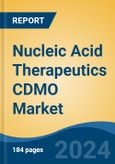RNA-based Therapies is the fastest growing segment, North America is the largest regional market
Speak directly to the analyst to clarify any post sales queries you may have.
10% Free customizationThis report comes with 10% free customization, enabling you to add data that meets your specific business needs.
Key Market Drivers
The expanding therapeutic pipeline for nucleic acid modalities significantly underpins the growth of the Contract Development and Manufacturing Organization market. The increasing number of novel drug candidates, including antisense oligonucleotides, messenger RNAs, and small interfering RNAs, necessitates specialized expertise and infrastructure for their development and large-scale production. These modalities offer targeted approaches for previously intractable diseases, creating a robust demand for outsourced services.For example, according to the article "Advancements in clinical RNA therapeutics: Present developments and prospective outlooks" published in PMC in April 2024, the exploration of antisense oligonucleotide-based therapies alone has progressed through 100 Phase I trials, with 25% of these advancing to Phase II or III trials, indicating a substantial volume of candidates requiring further development and manufacturing support. This progression through clinical stages directly translates into a requirement for advanced process development, analytical testing, and Good Manufacturing Practice compliant production.
Key Market Challenges
The inherent complexity and scalability issues associated with manufacturing advanced nucleic acid therapeutics, particularly in consistently achieving required quality and purity standards at commercial production volumes, represent a significant impedance to the growth of the global Contract Development and Manufacturing Organization (CDMO) market. These modalities often require specialized equipment, highly controlled environments, and intricate purification processes, leading to elevated operational costs and extended development timelines for CDMOs. Such manufacturing intricacies limit the capacity of CDMOs to efficiently process the increasing pipeline of novel drug candidates, creating bottlenecks within the supply chain.Key Market Trends
Strategic Capacity Expansion Initiatives represent a significant trend as Contract Development and Manufacturing Organizations invest heavily to meet the escalating demand for nucleic acid therapeutics. This involves constructing new facilities, expanding existing operational footprints, and integrating advanced equipment to enhance overall manufacturing throughput and capabilities.Such proactive investments are crucial for ensuring the reliable and timely supply of critical drug substances and products, thereby supporting the clinical and commercial progression of novel therapies. For instance, according to a BioSpace report in January 2024, Lonza projected flat sales for the year but confirmed mid-term guidance and reported full-year 2023 sales of $7.75 billion, driven by strong performance in its Biologics and Small Molecules divisions, highlighting sustained investment in its manufacturing network. In October 2024, Lonza also completed the acquisition of a large-scale biologics facility in Vacaville, US, from Roche, further expanding its capabilities and dedicating CHF 1.4 billion of CapEx in 2024 towards its organic investment program for future growth across technologies.
Key Market Players Profiled:
- Catalent Inc.
- Thermo Fisher Scientific Inc.
- Lonza Group Ltd.
- FUJIFILM Diosynth Biotechnologies U.S.A., Inc.
- Charles River Laboratories International, Inc.
- Eurofins Genomics
- Sirion Biotech GmbH
- Oxford Biomedica Plc.
- Danaher Corp.
Report Scope:
In this report, the Global Nucleic Acid Therapeutics CDMO Market has been segmented into the following categories:By Type:
- Gene Therapy
- RNA-based Therapies
By Service:
- Process Development & Optimization
- Manufacturing Services
- Analytical and Quality Control Services
- Others
By Application:
- Oncology
- Genetic Disorders
- Infectious Diseases
- Others
By Region:
- North America
- Europe
- Asia-Pacific
- South America
- Middle East & Africa
Competitive Landscape
Company Profiles: Detailed analysis of the major companies present in the Global Nucleic Acid Therapeutics CDMO Market.Available Customizations:
With the given market data, the publisher offers customizations according to a company's specific needs. The following customization options are available for the report.Company Information
- Detailed analysis and profiling of additional market players (up to five).
This product will be delivered within 1-3 business days.
Table of Contents
Companies Mentioned
The companies profiled in this Nucleic Acid Therapeutics CDMO market report include:- Catalent Inc.
- Thermo Fisher Scientific Inc.
- Lonza Group Ltd.
- FUJIFILM Diosynth Biotechnologies U.S.A., Inc.
- Charles River Laboratories International, Inc.
- Eurofins Genomics
- Sirion Biotech GmbH
- Oxford Biomedica Plc.
- Danaher Corp.
Table Information
| Report Attribute | Details |
|---|---|
| No. of Pages | 182 |
| Published | November 2025 |
| Forecast Period | 2024 - 2030 |
| Estimated Market Value ( USD | $ 11.52 Billion |
| Forecasted Market Value ( USD | $ 18.58 Billion |
| Compound Annual Growth Rate | 8.2% |
| Regions Covered | Global |
| No. of Companies Mentioned | 10 |









